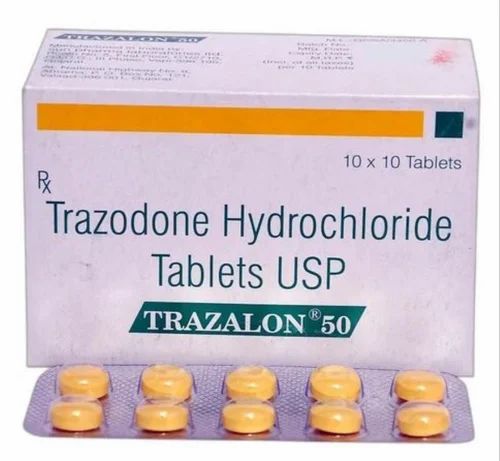Trazodone: Health Benefits & Risks
What are the health benefits of Trazodone?
Trazodone is an antidepressant medication that is also used off-label to treat insomnia. It belongs to a class of medications known as serotonin antagonist and reuptake inhibitors (SARIs). Trazodone has several potential health benefits, including:
- Antidepressant effects: Trazodone is primarily used to treat major depressive disorder. It works by increasing the levels of serotonin in the brain, which can help improve mood and reduce symptoms of depression.
- Sleep aid: Trazodone is commonly used off-label to treat insomnia, particularly in people who have difficulty falling asleep. It can help improve sleep quality and duration.
- Anxiety relief: Trazodone may help reduce symptoms of anxiety in some people. It can have a calming effect and may help improve overall sense of well-being.
- Low risk of sexual side effects: Compared to some other antidepressants, trazodone is less likely to cause sexual side effects such as decreased libido, erectile dysfunction, and delayed ejaculation.
- Low risk of weight gain: Trazodone is less likely to cause weight gain compared to some other antidepressants, which can be beneficial for individuals concerned about weight management.
- Fewer anticholinergic side effects: Trazodone has fewer anticholinergic side effects (such as dry mouth, constipation, and blurred vision) compared to some other antidepressants.
It’s important to note that while trazodone can be effective for many people, it may not be suitable for everyone. Trazodone can interact with other medications and may not be appropriate for people with certain medical conditions. It’s essential to consult with a healthcare provider before starting trazodone or any other medication to determine if it is the right choice for you.
What are the health risks of Trazodone?
Trazodone is generally considered safe and well-tolerated for most people when used as prescribed. However, like all medications, trazodone carries some health risks and potential side effects. It’s important to be aware of these risks and discuss them with your healthcare provider before starting treatment. Some of the health risks associated with trazodone include:
- Sedation: Trazodone can cause drowsiness and sedation, especially when first starting treatment or when the dose is increased. This can impair your ability to drive or operate machinery.
- Orthostatic hypotension: Trazodone can cause a sudden drop in blood pressure when standing up from a sitting or lying position, which can lead to dizziness or fainting. This effect is more common in older adults.
- Serotonin syndrome: Trazodone can interact with other medications that increase serotonin levels in the brain, such as selective serotonin reuptake inhibitors (SSRIs) or serotonin-norepinephrine reuptake inhibitors (SNRIs), leading to serotonin syndrome. Symptoms of serotonin syndrome may include confusion, hallucinations, rapid heartbeat, and loss of coordination.
- Priapism: Trazodone has been associated with priapism, a painful and prolonged erection that can last for several hours and requires immediate medical attention. Priapism is a rare but serious side effect of trazodone.
- Withdrawal symptoms: Stopping trazodone abruptly can lead to withdrawal symptoms, including insomnia, irritability, and anxiety. It’s important to taper off trazodone gradually under the guidance of a healthcare provider.
- Increased risk of suicidal thoughts: Like other antidepressants, trazodone may increase the risk of suicidal thoughts or behavior, especially in children, adolescents, and young adults. It’s important to monitor for signs of worsening depression or suicidal thoughts while taking trazodone.
- Other side effects: Common side effects of trazodone may include dry mouth, blurred vision, constipation, and weight changes. These side effects are usually mild and temporary but should be reported to your healthcare provider if they persist or worsen.
It’s important to discuss any concerns or questions about trazodone with your healthcare provider before starting treatment. Your healthcare provider can help determine if trazodone is the right choice for you and can monitor you for any potential side effects or health risks.
TL;DR: Trazodone Summary
Trazodone is a prescription medication that belongs to a class of drugs known as serotonin antagonist and reuptake inhibitors (SARIs). It is primarily used to treat depression, but it is also commonly prescribed off-label to treat insomnia due to its sedative effects.
Trazodone works by modulating the levels of serotonin in the brain, a neurotransmitter that plays a critical role in regulating mood, sleep, and emotions. By increasing serotonin levels, Trazodone can help alleviate symptoms of depression and improve sleep patterns in individuals with insomnia.
Trazodone is available in tablet form, typically taken orally, and is often prescribed in lower doses for the treatment of insomnia. The dosage and duration of treatment with Trazodone will vary depending on the individual’s condition, medical history, and response to the medication.
Common side effects of Trazodone may include drowsiness, dizziness, dry mouth, blurred vision, and constipation. More severe side effects may include changes in heart rate, low blood pressure, seizures, and allergic reactions. It is important to seek medical attention if you experience any severe or persistent side effects while taking Trazodone.
Trazodone can interact with other medications and substances, so it is important to inform your healthcare provider about any existing medical conditions or medications you are taking before starting treatment with Trazodone.
It is essential to follow your healthcare provider’s instructions closely while taking Trazodone and to attend regular follow-up appointments to monitor your response to treatment. Do not exceed the recommended dosage or take Trazodone for longer periods than advised to avoid the risk of adverse effects. Talk to your healthcare provider if you have any concerns about taking the medication or if you experience negative side effects.
If you have any questions or concerns about taking Trazodone, be sure to discuss them with your healthcare provider. It is important to seek medical advice if you have any concerns about your condition or experience any negative side effects while taking Trazodone.




